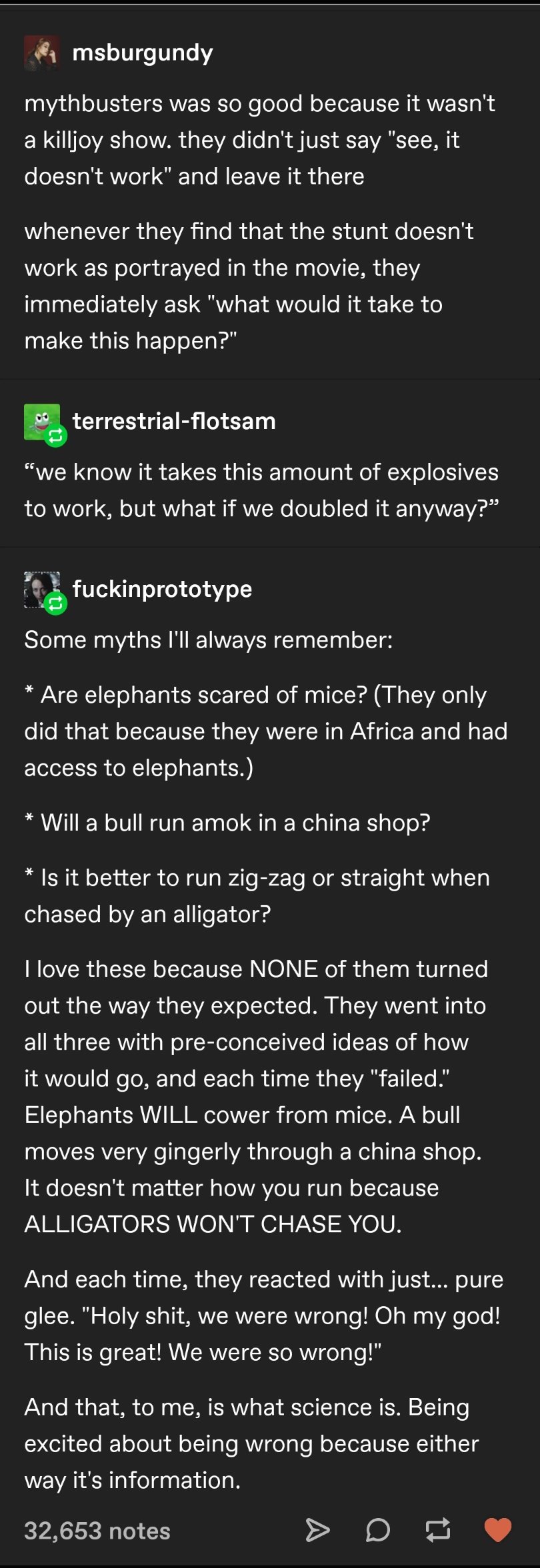this post was submitted on 15 Dec 2023
1503 points (98.9% liked)
tumblr
3432 readers
326 users here now
Welcome to /c/tumblr, a place for all your tumblr screenshots and news.
Our Rules:
-
Keep it civil. We're all people here. Be respectful to one another.
-
No sexism, racism, homophobia, transphobia or any other flavor of bigotry. I should not need to explain this one.
-
Must be tumblr related. This one is kind of a given.
-
Try not to repost anything posted within the past month. Beyond that, go for it. Not everyone is on every site all the time.
-
No unnecessary negativity. Just because you don't like a thing doesn't mean that you need to spend the entire comment section complaining about said thing. Just downvote and move on.
Sister Communities:
-
/c/[email protected] - Star Trek chat, memes and shitposts
-
/c/[email protected] - General memes
founded 1 year ago
MODERATORS
you are viewing a single comment's thread
view the rest of the comments
view the rest of the comments

No it doesn't. It purports to know exactly what a PhD scientist who was critical in the invention of the atomic bomb is thinking. Feynman would not have advocated for the propagation of junk science.
Here are some direct quotes from Feynman regarding his thoughts on the value of science:
"With more knowledge comes a deeper, more wonderful mystery, luring one on to penetrate deeper still. Never concerned that the answer may prove disappointing, with pleasure and confidence we turn over each new stone to find unimagined strangeness leading on to more wonderful questions and mysteries —certainly a grand adventure!"
"It is true that few unscientific people have this particular type of religious experience. Our poets do not write about it; our artists do not try to portray this remarkable thing. I don't know why. Is no one inspired by our present picture of the universe? This value of science remains unsung by singers: you are reduced to hearing not a song or poem, but an evening lecture about it. This is not yet a scientific age."
"Hardly anyone can understand the importance of an idea, it is so remarkable. Except that, possibly, some children catch on. And when a child catches on to an idea like that, we have a scientist. It is late—although not too late—for them to get the spirit when they are in our universities, so we must attempt to explain these ideas to children."
And the full story is too long to quote, but in one of his books Feynman recounts performing his own little Mythbusters style experiment in front of NASA to show how temperature affects O-rings when they were trying to figure out what caused the Challenger to fall apart. An experiment he performed because he was getting sick of the stacks of papers piling up as the discussion went on and all they were doing was ruminating over the minor details. In his own words:
"I say to myself, "Damn it, / can find out about that rubber without having NASA send notes back and forth: I just have to try it! All I have to do is get a sample of the rubber." I think, "I could do this tomorrow while we're all sittin' around, listening to this Cook crap we heard today. We always get ice water in those meetings; that's something I can do to save time." Then I think, "No, that would be gauche." But then I think of Luis Alvarez, the physicist. He's a guy I admire for his gutsiness and sense of humor, and I think, "If Alvarez was on this commission, he would do it, and that's good enough for me.""
A lot of his autobiographical stories are filled with examples of him doing these types of experiments, big and small, ever since he was a kid. Ones without a ton of "rigor". The same style of experiments that Mythbusters tended to do.
So Feynman would totally agree with Xkcd here about what's really important when it comes to science, sorry to break it to ya. He was a Mythbuster at heart.